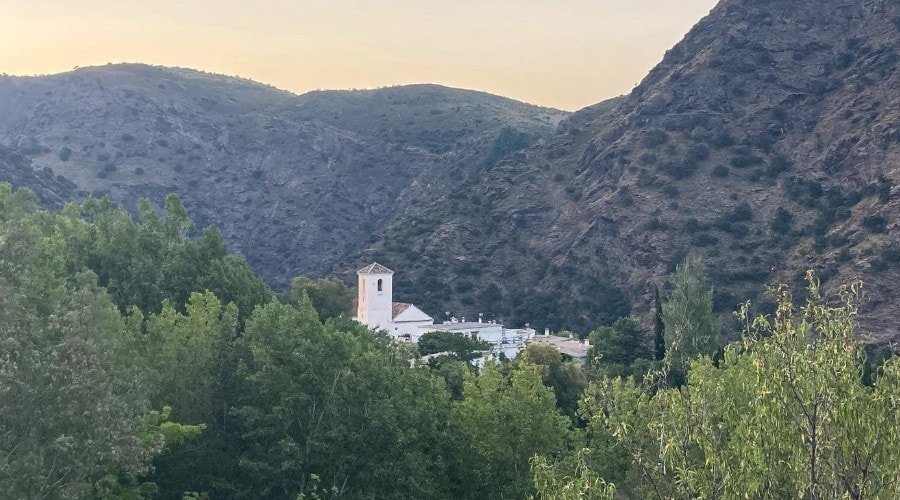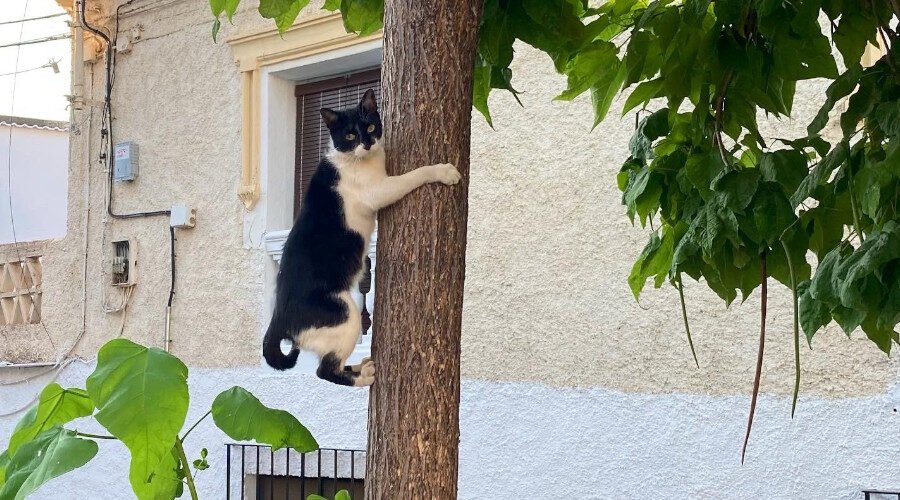One thousand words a day on a Casa Ana writing retreat in Spain
Olivia Snaije reviews a writing retreat in the Alpujarra region of Andalucia and finds studious writing sessions, delicious meals and mountain air make for a fantastic and fruitful experience
I arrived in Ferreirola slightly green around the gills. The hamlet is one of Andalusia’s Moorish “white villages” that British author Gerald Brenan described so beautifully in his travelogue, South from Granada. In the 1920s and 30s, Brenan lived in the remote village of Yegen, which is about an hour’s drive from Ferreirola where fewer than 30 people live year-round. The roads of the Alpujarra region wind around the southern flank of the Sierra Nevada mountains and can be a little rough if you suffer from motion sickness. But the short walk from the car park in Ferreirola’s main plaza, where the baker would pull up in his van around noon every day to sell fresh bread, past the fountain with running water from a spring, past the fig tree and a right turn onto the street where Casa Ana is located was enough distraction to recover.
Casa Ana is an elegantly restored 400-year-old house in typical Alpujarra style which is arranged around a courtyard garden filled with roses, lavender and wisteria, where three resident cats lounge on the stone stairways off the courtyard leading to rooms, or nap amidst the flowers. The owner, Anne Hunt, in a past life was responsible for launching and promoting some of the most brilliant musicians from around globe. In 2004 she bought Casa Ana, from where she organises creative retreats as well as walking holidays. I had signed up for my first week-long retreat ever—a professional journalist with a few non-fiction books under my belt, I was moving into an entirely new territory with a fiction project and needed help.
Our group of nine slowly began to assemble on the terrace, which looks out over the Trevelez river gorge and the mountains. We shared a welcome glass of Cava while Nancy, who smoothy handles admin, explained how the week would unfold. All meals would be provided besides two evenings when we would go to local restaurants together. We would write from 9.30am until 1pm and from 2.30 until 6pm. It would be “silent time” in common spaces during those hours. We tittered and raised our eyebrows at each other but really, I got the sense that we were all happy to have these guidelines.
“Award-winning poet, writer, polyglot and global nomad, Mary-Janes Holmes, had just the right balance of professional know-how, kindness, encouragement, yet demanding rigour, to guide us through the variety of projects we were working on”
The group was on the older side, predominantly female, with the youngest participant in her 40s, and the eldest a spry 80, but this meant that people had rich professional pasts and present careers. Furthermore, our group was working on a wide variety of prose: memoir, poetry, fiction, non-fiction, a graphic novel, and flash fiction.
The rooms at Casa Ana are all different and some are off the courtyard, while others are in a lower area, which was my case. I immediately took to my room, which was simple, but impeccably clean, with a desk and a straightforward wooden chair which, because of its design, forced you into having good posture when seated. I liked the bathroom, too, which had a rain shower and tadelakt Moroccan plastering.
At dinner we met Mary-Janes Holmes, an award-winning poet, writer, polyglot, and global nomad, who teaches creative writing. As we learned over the next week, she had just the right balance of professional know-how, kindness, encouragement, yet demanding rigour, to guide us through the variety of styles and projects we were working on. We were to have two group sessions during the week, where we would read from our work for five minutes, and five minutes were allotted to comments from the group. We could have as many individual sessions as we liked, but these were at extra cost. I chose to have two during my week; people generally seemed to choose two or three sessions. A few people had already done retreats with Mary-Jane before and were on to new projects; but for everyone, this was our first post pandemic lockdown group activity.
From the first dinner served in the communal dining room around a long rustic wooden table it became clear that the meals were going to be one of the highlights. Anne Hunt uses several cooks who rotate, providing breakfast, lunch, and dinner, all of which are made with fresh, local products. Here’s what we ate the first night: watermelon and fresh goat cheese, a salad with olive oil, lemon, orange flower water, and pomegranate syrup, then grilled fish with cayenne butter, new potatoes, roasted courgettes, baby beets and carrots. For dessert there was a lemon posset with mini lemon shortbread. And it went on like this all week.
Breakfasts were no less glorious. As a person who cooks a lot, it was an incredible luxury to have someone else do all the planning, shopping, and cooking. The fact that the meals were provided gave me the structure between phyllo tarts with caramelised onions, goat cheese, figs, and walnuts, or medallions of pork in Pedro Ximénez sauce, to focus only on my writing.
I had a one-on-one meeting with Mary-Jane the very next day, to get going right away. She had asked participants to send her samples of their projects, so she already had an idea of what I was working on. In my notes from the first session, I jotted down in bold: Be wary of adjectives and adverbs. And then: At the end of a story, you must be able to say: "Well, of course.”
I sat in my wooden chair and worked, getting up before lunchtime to walk the ten minutes down a path leading out of Ferreirola towards la gaseosa, a natural spring providing cool bubbly water where I’d fill up my canteen. I also began to take walks early in the morning cool before breakfast to avoid the July heat, dry and intense, during the day.
By lunchtime I was very happy to take a break and having meals with the group and getting to know each person better was a welcome and interesting distraction. Then it was back to the desk, possibly a 20-minute nap at some point, and suddenly it was dinner time. Yoga and massages were also available, but I felt too inspired to want to take time away from working. We could also get wine or beer to drink on the terrace while watching dusk creep over the mountains; you also had the option of walking to the nearby village of Mecina to get a drink.
During our first group session the atmosphere was caring and safe. One woman cried as she was reading. The quality of the writing was all good. By the second group session, the effect of Mary-Jane’s one-on-one sessions with each of us was evident. The writing was much tighter, and people were more confident. One woman read an intensely personal account of a chilling event. The woman who had cried during the first event had managed to make her chapter far more personal and she seemed in control of her memoir-in-progress. I felt like I had progressed tremendously as well, and that the work during the day, using Mary-Jane’s advice, had helped me move forward in leaps and bounds.
The week sped by and by the time I left, I felt like mind and body had been fed, the air had been pure, and I left with a sense of accomplishment and well-being. The experience at Casa Ana is something I’ll treasure.






